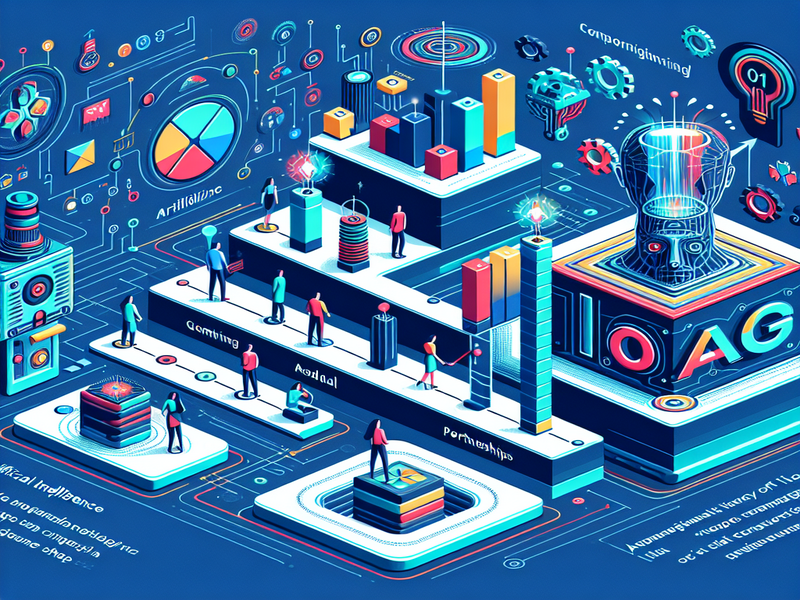- Updated: September 23, 2024
- 4 min read
OpenAI’s Progress Towards AGI: Two Stages Away
OpenAI Inches Closer to AGI: Mapping the Path to Artificial General Intelligence
The race towards artificial general intelligence (AGI) has been a long and arduous journey, with tech giants and research institutions relentlessly pushing the boundaries of AI capabilities. Among the frontrunners in this pursuit is OpenAI, a company that has consistently made groundbreaking strides in the field of artificial intelligence. In a recent revelation, OpenAI’s CEO, Sam Altman, shed light on the company’s progress and the stages they envision in the quest for AGI.
The Stages of AI Development
According to Altman, the development of AI can be divided into five distinct levels. The first stage, chatbots, has already been achieved, and the second stage, reasoners, has recently been unlocked by OpenAI with the introduction of their o1 model. This advanced language model boasts improved reasoning and problem-solving capabilities, taking more time to process and think through complex queries.
The third stage, agents, represents the next frontier, where AI systems will be capable of exhibiting agentic experiences and autonomously carrying out tasks. Altman believes that the transition from reasoners to agents will be relatively swift, thanks to the groundwork laid by the o1 model. “The agentic experiences that we expect this technology [level 2] to eventually enable, I think will be quite impactful,” he stated.
At first, most believed that LLMs couldn’t reach AGI without a new approach. But my mind changed based on the o1 model results. I’m now imagining a GPT-5 model with CoT reasoning, powered by specialized faster chips similar to Groq chips. Despite high costs, this could make AGI possible. – Haider, e/acc user on X
The fourth stage, innovators, represents AI systems that can not only run processes but also improve them through critical thinking and independent innovation. Finally, the fifth stage, organizations, envisions AI capable of performing the entire work of a company without human involvement, essentially achieving true AGI.
Key Partnerships and Collaborations
OpenAI’s pursuit of AGI is not a solitary endeavor. The company has forged strategic partnerships with industry leaders to accelerate its progress. One such collaboration is with T-Mobile, where OpenAI will help build AI agents for customer service on the telecom operator’s platform IntentCX, leveraging OpenAI’s APIs and the powerful o1 model.
This partnership highlights the growing demand for AI agents in enterprise settings, as companies seek to enhance customer experiences and streamline operations. As Altman noted, “The agentic experiences that we expect this technology to eventually enable, I think, will be quite impactful.”
The Potential of the o1 Model
The o1 model, with its improved reasoning and problem-solving capabilities, has opened the doors for OpenAI’s gateway to AGI. Noam Brown, a researcher at OpenAI, emphasized the importance of witnessing models perform better than humans in domains that truly matter, alluding to the o1 model’s potential.
“I think for a lot of people it’s uh it’s hard to really fill the AGI and until you see the models do something better than humans can at a domain that you really care about,” said Brown.

Industry Movements and AI Capabilities
While OpenAI is focused on advancing AI towards AGI, the industry as a whole has already embraced the concept of AI agents. Cloud and SaaS giants like Salesforce, Oracle, and Microsoft have announced their own agentic capabilities, integrating AI agents across their enterprise suites.
For instance, Salesforce unveiled over 100 AI agents at their recent Dreamforce event, while Oracle announced 50+ AI agents. Although these agents are currently semi-autonomous, they represent a significant step towards the fully autonomous agents that Altman envisions.
The agentic experiences that we expect this technology [level 2] to eventually enable, I think will be quite impactful. – Sam Altman, CEO of OpenAI
As the industry continues to embrace AI agents, the path towards AGI becomes clearer. With level three, agents, already being implemented, the big tech companies are now only two steps away from achieving the ultimate goal of artificial general intelligence.
Conclusion
OpenAI’s ambitious roadmap towards AGI is a testament to the rapid advancements in AI technology. By clearly defining the stages of AI development and introducing groundbreaking models like o1, the company is paving the way for a future where AI systems can not only reason and process information but also exhibit agency, innovation, and autonomy.
As the industry collectively embraces AI agents and autonomous organizations, the prospect of achieving AGI becomes increasingly tangible. With key partnerships and collaborations fueling its progress, OpenAI is well-positioned to lead the charge towards this monumental milestone in the field of artificial intelligence.
Stay tuned for more updates and insights on the UBOS homepage, as we continue to explore the fascinating world of AI and its impact on various industries.
